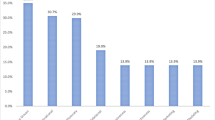Abstract
Emergent leadership was examined in relation to sex and task type; 120 subjects participated in four-person mixed-sex groups. Three task conditions (masculine, neutral, and feminine gender orientations) were tested with 10 groups in each condition. It was predicted and found that more men than women would emerge as leaders in the masculine and neutral task conditions, while more women would assume the leadership role in the feminine task condition. The effects of the gender orientation of a task are discussed. It is suggested that expertise with a task may explain the “task type” effect found.
Similar content being viewed by others
References
Anderson, L. R., & Blanchard, P. N. Sex differences in task and social-emotional behavior. Basic and Applied Social Psychology, 1982, 3, 109–139.
Aries, E. Interaction patterns and themes of male, female, and mixed groups. Small Group Behavior, 1976, 7, 7–18.
Babinec, C. S. Sex, communication structures and role specification. Sociological Focus, 1978, 11, 199–210.
Bowman, G. What helps or harms promotability. Harvard Business Review, 1964, 42, 184–196.
Burke, R. J., Maier, N. R. F., & Hoffman, L. R. Function of hints in individual problem solving. American Journal of Psychology, 1966, 79, 389–399.
Collaros, P. A., & Anderson, L. R. Effect of perceived expertness upon creativity of members of brainstorming groups. Journal of Applied Psychology, 1969, 2, 159–163.
Denmark, F. L. Styles of leadership. Psychology of Women Quarterly, 1977, 2, 99–113.
Gintner, G., & Linskold, S. Rate of participation and expertise as factors influencing leader choice. Journal of Personality and Social Psychology, 1975, 32, 1085–1089.
Gruber, K. J., & Gaebelein, J. Sex differences in listening comprehension. Sex Roles, 1979, 5, 299–310.
Hemphill, J. K. Why people attempt to lead. In L. Petrullo & B. M. Bass (Eds.), Leadership and interpersonal behavior. New York: Holt, 1961.
Keyser, D. Emergent leadership as a function of sex and task type. Unpublished master's thesis, Wayne State University, 1979.
Mamola, C. Women in mixed groups: Some research findings. Small Group Behavior, 1979, 10, 431–440.
Meeker, B. F., & Weitzel-O'Neill, P. A. Sex roles and interpersonal behavior in task-oriented groups. American Sociological Review, 1977, 42, 91–105.
Megargee, E. I. Influence of sex roles on the manifestation of leadership. Journal of Applied Psychology, 1969, 53, 377–382.
Megargee, E. I., Bogart, P., & Anderson, B. J. Prediction of leadership in a simulated industrial task. Journal of Applied Psychology, 1966, 50, 292–295.
Milton, G. A. Sex differences in problem solving as a function of role appropriateness of the problem content. Psychological Reports, 1959, 5, 705–708.
O'Leary, V. E. Some attitudinal barriers to occupational aspirations in women. Psychological Bulletin, 1974, 81, 809–826.
Piliavin, J. A., & Martin, R. R. The effects of the sex composition of groups on style of social interaction. Sex Roles, 1978, 4, 281–296.
Schein, V. E. The relationship between sex role stereotypes and requisite management characteristics. Journal of Applied Psychology, 1973, 57, 95–100.
Schneider, C. E. The contingency model of leadership: An extension to emergent leadership and leader's sex. Organizational Behavior and Human Performance, 1978, 21, 220–239.
Schneider, C. E., & Bartol, K. Sex effects in emergent leadership. Journal of Applied Psychology, 1980, 65, 341–345.
Smelser, W. T. Dominance as a factor in achievement and perception in cooperative problem solving interactions. Journal of Abnormal and Social Psychology, 1961, 62, 535–542.
Snyder, M. Self-monitoring of expressive behavior. Journal of Personality and Social Psychology, 1974, 30, 526–537.
Steiner, I. D. Group process and productivity. New York: Academic Press, 1972.
Stogdill, R. Handbook of leadership. New York: Free Press, 1974.
Author information
Authors and Affiliations
Additional information
This study is based on the senior author's master's thesis, conducted at Wayne State University under the direction of the second author.
Rights and permissions
About this article
Cite this article
Wentworth, D.K., Anderson, L.R. Emergent leadership as a function of sex and task type. Sex Roles 11, 513–524 (1984). https://doi.org/10.1007/BF00287475
Issue Date:
DOI: https://doi.org/10.1007/BF00287475




